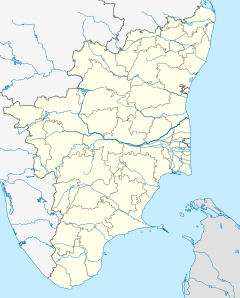
Apatsahayesvarar Temple, Alangudi or Guru Sthalam or Tiru Irum Poolai is a Hindu temple dedicated to Shiva located in the village of Alangudi in the Valangaiman taluk of Tiruvarur district, Tamil Nadu, India. Shiva is worshipped as Apathsahyesvarar, and is represented by the lingam. His consort Parvati is depicted as Elavarkuzhali. The presiding deity is revered in the 7th century Tamil Saiva canonical work, the Tevaram, written by Tamil saint poets known as the Nayanmars and classified as Paadal Petra Sthalam.
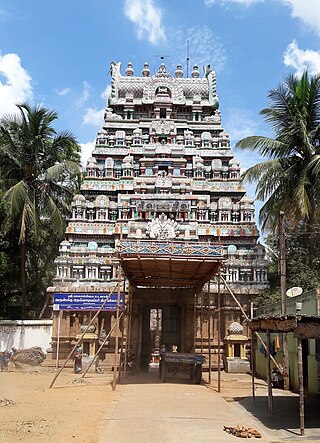
Neyyadiappar Temple, Tillaistanam is a Hindu temple dedicated to Shiva located in the village of Thillaisthanam also known as Tillaisthanam or Thiruneithanam in Tamil Nadu, India. It is significant to the Hindu sect of Shaivism as one of the Saptasthanam, the seven temples associated with Aiyarappar temple in Thiruvaiyaru. Shiva is represented by the lingam in the form of Neyyadiappar. His consort Parvati is depicted as Piraisoodi Amman. The presiding deity is revered in the 7th century Tamil Shaiva canonical work, the Tevaram, written by Tamil saint poets known as the nayanars and classified as Paadal Petra Sthalam.

Kandeeswarar Temple is a Hindu temple dedicated to the god Shiva located in Kandiyur also known as Thirukkandiyur or Tirukkandiyur, near Tiruvaiyaru, Tamil Nadu, India. Shiva is worshiped as Kandeeswarar, and is represented by the lingam and his consort Parvati is depicted as Mangalanayagi. The presiding deity is revered in the 7th century Tamil Saiva canonical work, the Tevaram, written by Tamil poet saints known as the nayanars and classified as Paadal Petra Sthalam. As per legends, Shiva is believed to have destroyed eight different demons and the eight Ashta Veeratanam temples are built signifying each of his victories in the war. The temple is one of the eight where Shiva is believed to have removed one of the five heads of Brahma.

Aiyarappar is a Hindu temple dedicated to Shiva located in the village of Tiruvaiyaru, Tamil Nadu, India. Shiva is worshiped as Aiyarappar, and is represented by the lingam and his consort Parvati is depicted as AramValarthaNaayagi. The presiding deity is revered in the 7th century Tamil Saiva canonical work, the Tevaram, written by Tamil poet saints known as the nayanars and classified as Paadal Petra Sthalam.
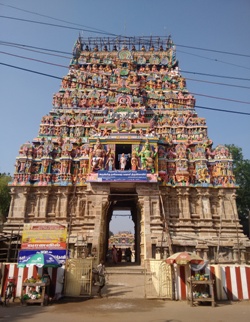
Nageswaraswamy Temple is a Hindu temple dedicated to Shiva located in Kumbakonam in Thanjavur district, Tamil Nadu, India. The presiding deity is revered in the 7th-century Tamil Saiva canonical work, the Tevaram, written by Tamil poet saints known as the nayanars and classified as Paadal Petra Sthalam. The temple is counted as the earliest of all Chola temples. Shiva in the guise of Nagaraja, the serpent king..
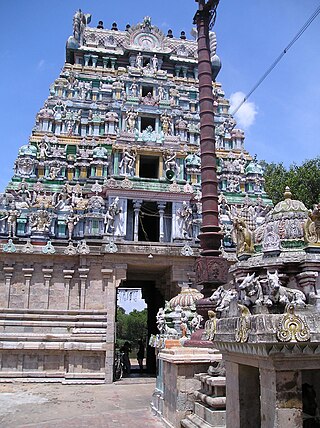
Kalyanasundaresar Temple, Nallur or Thirunallur is a Hindu temple dedicated to the deity Shiva in Nallur, Tamil Nadu, India. It is located 10 km (6.2 mi) away from Kumbakonam, 6 km (3.7 mi) east of Thirukkarugavur, and 30 km (19 mi) south of Thanjavur.
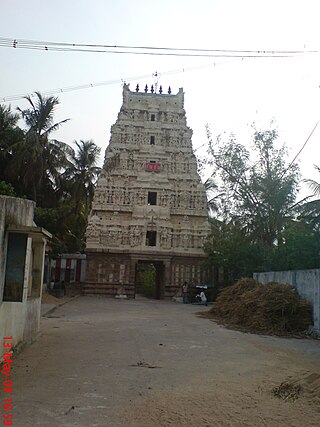
Anbil Alanthurai Temple is a temple dedicated to Shiva, located on the banks of the Kollidam river in Anbil, a small village near Lalgudi. is a Hindu temple dedicated to Shiva located in the village of Tiruchotruthurai, Tamil Nadu, India. Shiva is worshiped as Sathyavaheeswarar, and is represented by the lingam and his consort Parvati is depicted as Soundaranayagi. The presiding deity is revered in the 7th century Tamil Saiva canonical work, the Tevaram, written by Tamil poet saints known as the nayanars and classified as Paadal Petra Sthalam.

Sivayoginathar Temple also known as Yoganandeswarar temple is a Hindu temple dedicated to Shiva located in is located in Thiruvisanallur in Thanjavur district, Tamil Nadu, India. Shiva is worshiped as Sivayoginathar, and is represented by the lingam and his consort Parvati is depicted as Mangala Nayagi. The presiding deity is revered in the 7th century Tamil Saiva canonical work, the Tevaram, written by Tamil poet saints known as the nayanars and classified as Paadal Petra Sthalam.
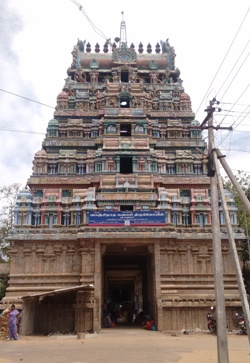
Vanchinadha Swamy temple is a Hindu temple dedicated to the deity Shiva, located in Srivanchiyam, Tiruvarur District, Tamil Nadu, India. Shiva is worshiped as Vanchinadha Swamy, and is represented by the lingam. His consort Parvati is depicted as Mangalambigai Amman. The presiding deity is revered in the 7th century Tamil Saiva canonical work, the Tevaram, written by Tamil saint poets known as the Nayanmars and classified as Paadal Petra Sthalam.

Pushpavananathar Temple is a Hindu temple dedicated to Shiva located in the village of Tiruppoonturutti near Tiruvaiyaru, Tamil Nadu, India. Shiva is worshiped as Aiyarappar, and is represented by the lingam and his consort Parvati is depicted as Soundaranayagi. The presiding deity is revered in the 7th century Tamil Saiva canonical work, the Tevaram, written by Tamil poet saints known as the nayanars and classified as Paadal Petra Sthalam.

Odhanavaneswarar Temple, Tiruchotruturai is a Hindu temple dedicated to Shiva located in the village of Tiruchotruthurai, Tamil Nadu, India. The Five Rivers are Vadavaru, Vennaaru, Vettaaru, Kudamuruttiyaaru and Kaaviriyaaru. Shiva is worshiped as Odhanavaneswarar, and is represented by the lingam and his consort Parvati is depicted as Annapoorani. The presiding deity is revered in the 7th century Tamil Saiva canonical work, the Tevaram, written by Tamil poet saints known as the nayanars and classified as Paadal Petra Sthalam.

Apathsahayar Temple, Thirupazhanam is a Hindu temple dedicated to Shiva located in Thirupazhanam near Tiruvaiyaru, Tamil Nadu, India. The presiding deity is revered in the 7th century Tamil Saiva canonical work, the Tevaram, written by Tamil poet saints known as the nayanars and classified as Paadal Petra Sthalam. The temple is counted as the earliest of all Chola temples.

Tirunallar Saniswaran Temple or Dharbaranyeswarar Temple is a Hindu temple dedicated to the deity Shiva, located in a village, Thirunallar of karaikal district of Union territory of Puducherry (24 km from Nagapattinam town of Tamil Nadu.
Brahmapureeswarar Temple or Thiurkolili is a Hindu temple dedicated to Shiva located in Thirukkuvalai in Nagapattinam district of Tamil Nadu, India. Shiva is worshiped as Brahmapureeswarar, and is represented by the lingam and his consort Parvati is depicted as Vandamar Poonguzhali. The presiding deity is revered in the 7th century Tamil Saiva canonical work, the Tevaram, written by Tamil poet saints known as the nayanars and classified as Paadal Petra Sthalam.

Pasupatheeswarar Temple, Avoor or Avoor Pasupatheeswaram is a Hindu temple dedicated to Hindu god Shiva, located in the village Avoor, located 12 km south of South Indian town, Kumbakonam, Tamil Nadu, India. The temple is one of the 70 madakoil built by 2nd century Chola king, Kochengat Chola. The temple is known for the Panchabairavar, the five images of Bhairavar. The temple is revered in the verses of Tevaram, the 7th century Tamil Saiva canon by Tirugnana Sambandar.

Amirthakadeswarar Temple is a Hindu temple dedicated to the deity Shiva, located at Sakkottai in Tamil Nadu, India. The temple is dedicated to Shiva. Shiva is worshiped as Amirthakadeswarar, and is represented by the lingam. His consort Parvati is depicted as Amirthavalli Amman. The presiding deity is revered in the 7th century Tamil Saiva canonical work, the Tevaram, written by Tamil saint poets known as the Nayanmars and classified as Paadal Petra Sthalam.
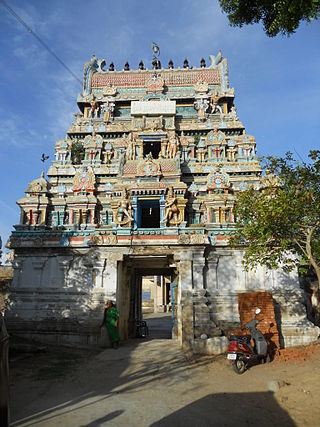
Padikasu Nathar Temple is a Hindu temple located at Azhagaputhur, a village in the Thanjavur district of Tamil Nadu, India. Shiva is worshiped as Padikasunathar, and is represented by the lingam. His consort Parvati is depicted as Soundaranayagi. The presiding deity is revered in the 7th century Tamil Saiva canonical work, the Tevaram, written by Tamil saint poets known as the nayanars and classified as Paadal Petra Sthalam. The 8th century Saiva saint poet Sundarar has sung praise about the temple in his works.

Panchavarnaswamy Temple (பஞ்சவர்ணஸ்வாமி கோயில்) is a Tamil temple dedicated to Shiva, located in Woraiyur, a neighborhood in the town of Tiruchirapalli in Tamil Nadu, India. Shiva is believed to portray five different colours, giving the name of the presiding deity, Panchavarnaswamy. Panchavarnaswamy is revered in the 7th century Tamil Saiva canonical work, the Tevaram, written by Tamil saint poets known as the tri-nayanars (சம்பந்தர், திருநாவுக்கரசர், சுந்தரர், and classified as Paadal Petra Sthalam.

Marundeeswarar Temple is a Hindu temple dedicated to the deity Shiva, located in T. Edaiyar, a village in Viluppuram district in the South Indian state of Tamil Nadu. Shiva is worshipped as Marundeeswarar, and is represented by the lingam. His consort Parvati is depicted as Balambigai. The temple is located on the Southern banks of Thenpennai River on the Thirukoilur - Thiruvennainallur road. The presiding deity is revered in the 7th century Tamil Saiva canonical work, the Tevaram, written by Tamil saint poets known as the nayanmars and classified as Paadal Petra Sthalam.

Pushpavaneswarar temple in Thirupuvanam, a town in Sivaganga district in the South Indian state of Tamil Nadu, is dedicated to the Hindu god Shiva. Constructed in the Dravidian style of architecture, the temple is believed to have been built during the Cholas period in the 7th century. Shiva is worshipped as Pushpavaneswarar and his consort Parvathi as Soundaranayagi.

